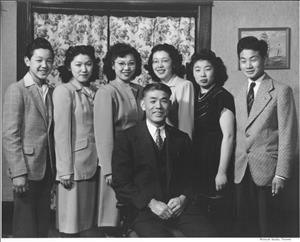On December 8, 1941, Japanese American World War I veteran and journalist Shuichi Fukui (1894-1967) responds to news of Japan's attack on Pearl Harbor by saying "We Japanese living in the United States are Americans" ("Japanese in County Shocked ..."). A Tacoma resident and U.S. citizen, Fukui makes his statement when reached for comment by the Tacoma Daily Ledger on the day that the U.S. declares war on Japan following the Pearl Harbor attack the previous day. Fukui's response is just one of many prominent examples of his loyalty to his adopted country.
U.S. Veteran, Tacoma Journalist
Born in 1894 in Yamaguchi-ken, Japan, Shuichi Fukui was among the early waves of Japanese immigrants to the United States and came to seek his fortune in 1912. Even before becoming a citizen of the country, he volunteered to serve in its army reserves and completed basic training in Hawai'i, making him one of the few Japanese American veterans of World War I. He and Sadaichi Fujita, both from Tacoma, were among the first Japanese Americans veterans to file for citizenship.
As a journalist and editor, Fukui participated in the making of Tacoma's vibrant Japantown (Nihonmachi) community. He operated a bookstore and served as a Tacoma correspondent for the Hokubei Hochi, a Seattle Japanese-language newspaper. Just before World War II, Fukui had become the last editor and owner of Tacoma's own Japanese-language newspaper, the Takoma Shuho (Tacoma Japanese Weekly). He had also just completed a new edition of the first major work of early Japanese American Tacoma history, Tacoma Nihonjin Hattenshi (History of the Japanese in Tacoma). The first edition of this history had been compiled by Shunichi Otsuka; Fukui added materials and reorganized the volume, which remained in Japanese until it was translated in 1986 by Dr. James Watanabe. To this day, the volume remains one of the two major primary sources on the history of Tacoma's Japanese Americans.
"We All Must Sacrifice"
Not long after giving the Ledger his statement of loyalty to his adopted homeland, Fukui, along with more than 700 other Japanese residents of Tacoma, was forcibly removed to the temporary Pinedale Assembly Center near Fresno, California. The Pinedale Logger, a newspaper published by residents of the assembly center, featured Fukui in an ongoing "resident spotlight" feature in the July 3, 1942, issue. Quoted in the feature, Fukui reiterated his loyalty to the United States despite his imprisonment:
"We should do our part in helping our country during this critical period. She needs the co-operation of every American and if our job is to stay in these internment centers we must and should do our utmost in co-operating with the authorities so that their task and our task is as easy and pleasant as possible. We all must sacrifice and give our best so that our way of life -- which is the only way of life for a free people -- may be preserved for now and ever more" ("Shuichi Fukui, American").
By this point, according to the article, Fukui had become "well known through the Northwest for his patriotic views in helping the nisei become the finest type of Americans" ("Shuichi Fukui, American"). After Pinedale, Fukui and his family were imprisoned at Tule Lake, California, from July 1942 to March 1943.
Return to Tacoma
Upon returning to Tacoma, Fukui began selling rice and then expanded into a grocery store in the Columbus Hotel, formerly a part of Tacoma's Japantown. Business directories for the storefront at 1554 Market Street show Fukui's Grocery Store from as early as 1947 through 1953. After he sold the grocery store in the 1950s, Fukui owned another business, the Tokyo Gift Shop, until his death in 1967. In a 1965 interview, he maintained that he did not face prejudice from Tacomans because he was selling mainly to Asian American customers.
Fukui was married twice, and had a total of five children: Tamiko Alice, Edwin, Lillian, Lucy, and Herbert Megumu. Both of Fukui's sons served in the United States military. Edwin was killed in action near Okinawa. The elder Fukui spoke at the funeral on behalf of himself and other parents of Nisei veterans who were killed in action during the war. His other son, Herbert, was returning home to visit his parents on leave when he died in an airplane crash in 1948. According to a Seattle Times article, Shuichi Fukui received the news "quietly" and then went back to serving his customers behind the grocery store counter ("C-47 Crash ...").
Fukui's store marked an important point of resettlement for the few Japanese Americans -- less than one in seven -- who decided to return to Tacoma after World War II.

